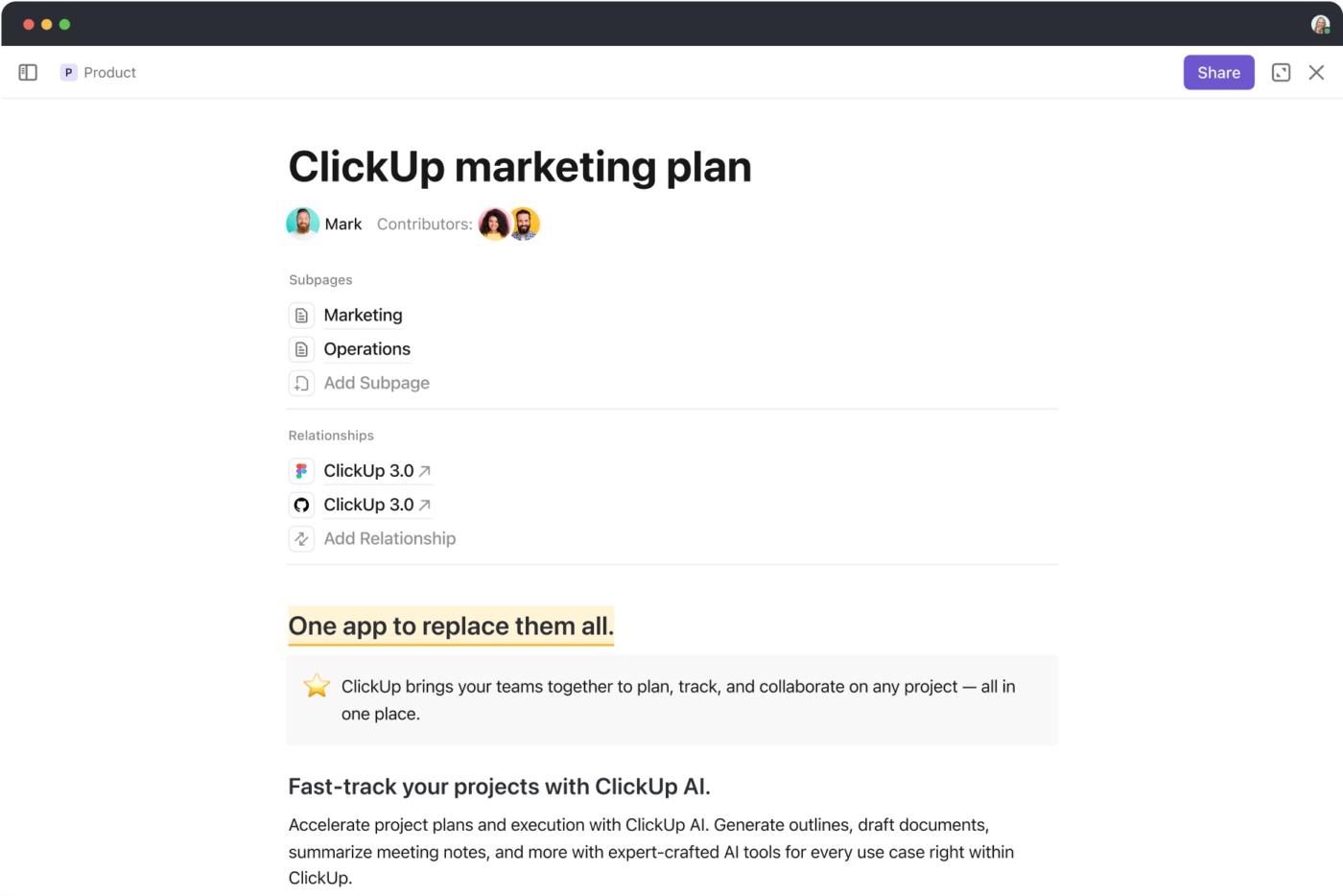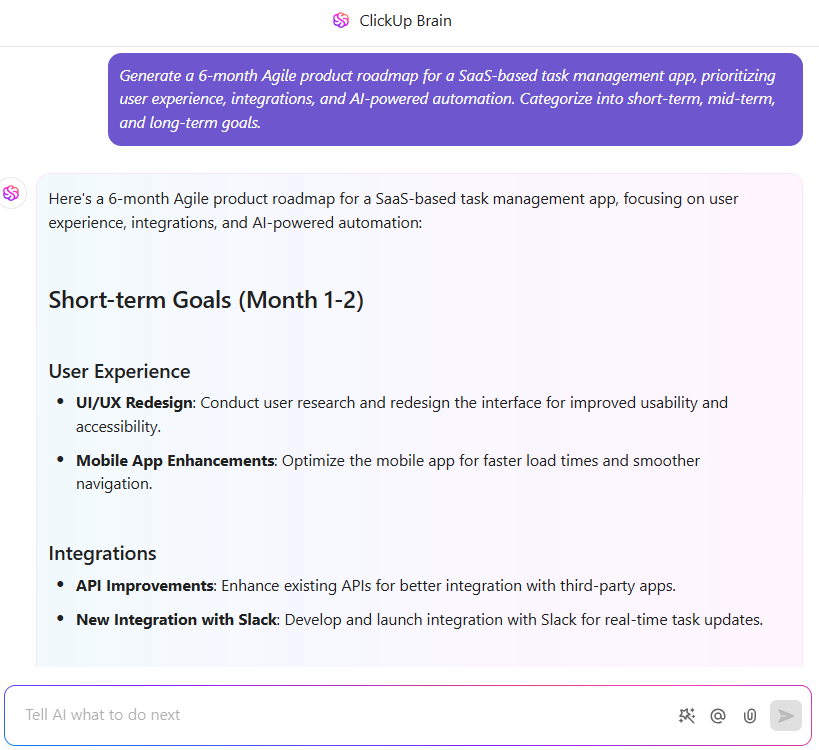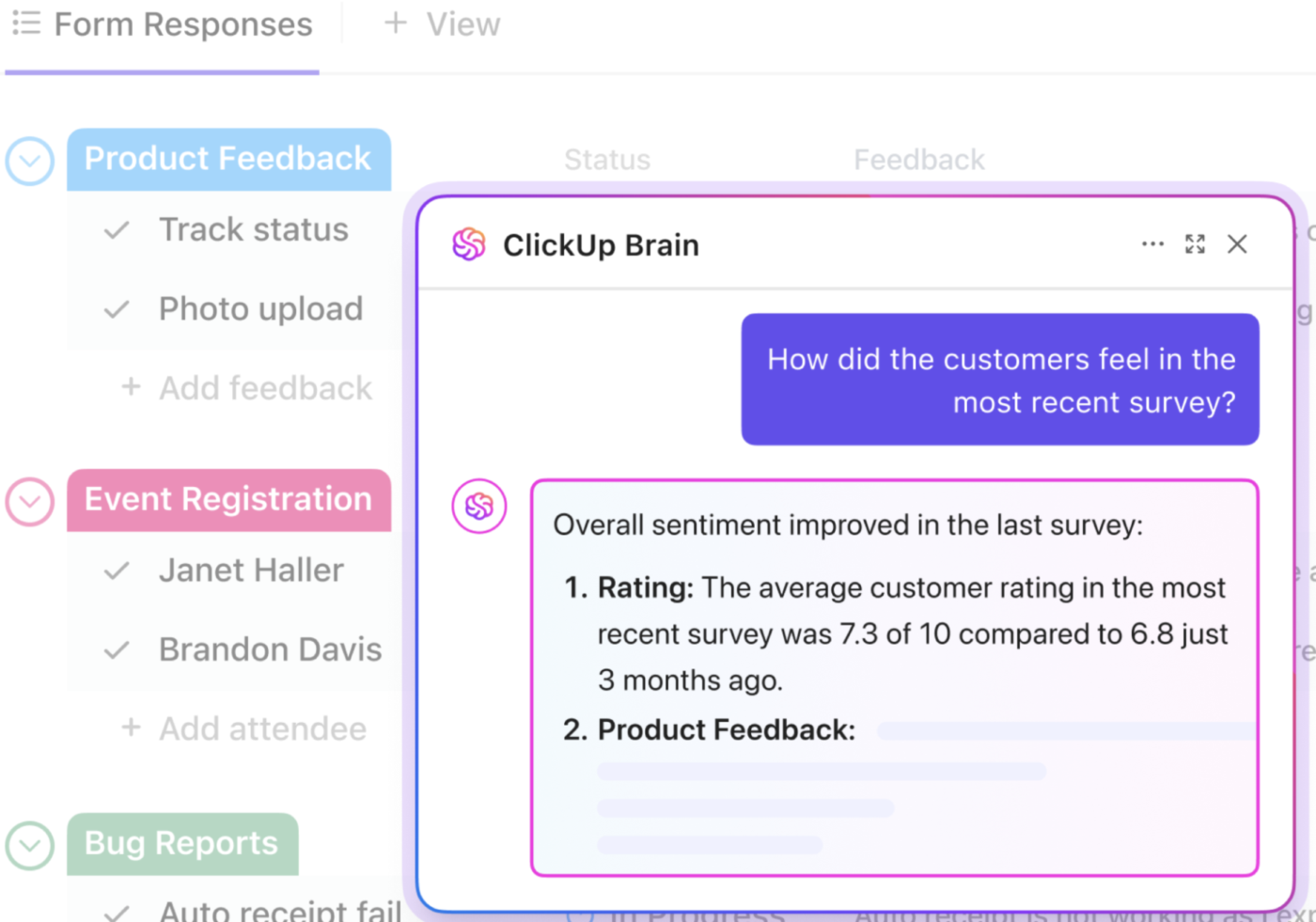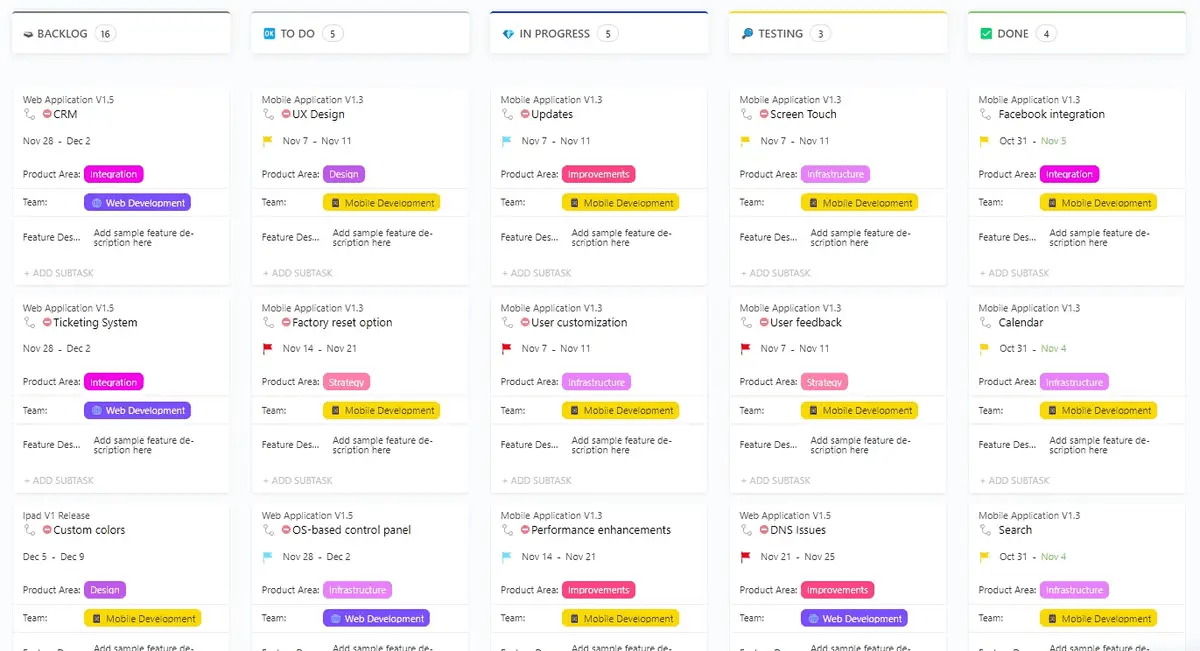Remember when the BlackBerry was the go-to for emailing on the move? Its small square design and clicky QWERTY keyboard made it feel like you were ahead of the game.
Then, the iPhone arrived, offering something new: a touchscreen, a sleek design, and an entire App Store. While BlackBerry stuck to its old ways, Apple adapted and left it behind.
This is the danger of resisting change—your competitors will race ahead.
This is where Agile product management steps in to help you stay adaptable, relevant, and ready to deliver fast. However, Agile isn’t a shortcut to faster results; it’s a shift in how you build, learn, and improve.
So, how do you make the shift the right way? Let’s break it down.
- What Is Agile Product Management?
- Agile Product Management: Essentials
- Agile Software Development Processes
- Key Benefits of Agile Product Management
- How to Implement Agile Product Management?
- Agile Methodologies and Frameworks
- Roles in Agile Product Management
- Best Practices for Successful Agile Product Management
- Challenges in Agile Product Management and How to Overcome Them
- Adapt Fast, Deliver Faster, and Win with ClickUp
⏰ 60-Second Summary
- Agile product management emphasizes speed, flexibility, and continuous improvement by working in iterative cycles known as sprints
- Unlike traditional methods, Agile product management uses short cycles and continuous feedback, whereas traditional approaches follow a linear, step-by-step process
- For product managers, the benefits of applying Agile principles include faster delivery, easier adaptation to change, improved team collaboration, higher product quality, and better business outcomes
- To implement Agile effectively, you should define a clear product vision, create a dynamic roadmap, prioritize the backlog, plan and execute sprints, and release products while adapting based on feedback
- Popular frameworks that support Agile product management include Scrum, Kanban, and Lean methodologies
- The key roles in Agile product management are product owners, Scrum masters, and development teams, each contributing to the process’s success
- Agile product managers face challenges such as scope creep, unrealistic deadlines, resistance to change, and the need to balance speed with quality
- To overcome challenges in Agile product management, align requests with business goals, offer training to teams, use realistic planning based on sprint data, and prioritize high-impact features
- ClickUp offers Agile product management tools like automated sprint cycles, real-time dashboards, and pre-built Agile templates to streamline the development and feedback process
What Is Agile Product Management?
Agile product management is a flexible, iterative approach where teams work in short cycles (sprints) to develop, test, and refine products based on customer feedback and market changes. It prioritizes speed, adaptability, and continuous improvement over rigid long-term plans.
📍 Take Spotify’s Discover Weekly, for example. Instead of spending years perfecting a music recommendation system, they launched a basic version, gathered user feedback, and kept improving it. Now, users get a fresh playlist every Monday, tailored to their taste—almost like Spotify knows your music taste better than they do.
That’s Agile product management in action: small, fast updates that keep things fresh and relevant.
Agile Product Management: Essentials
Now let’s discuss the must-know Agile fundamentals:
Definition and core principles
The Agile approach is a modern product development and management methodology focused on delivering the right solutions at the right time.
Agile product management is rooted in the Agile Manifesto (2001), which emphasizes four key Agile values:
- People over processes: Communication and teamwork drive progress, not rigid systems
- Working solutions over docs: Get products out fast, instead of getting stuck in planning
- Customer collaboration over contracts: Feedback shapes the product, not fixed agreements
- Adapting to change over sticking to a plan: Evolve as needs change, rather than following outdated plans
Apart from these, 12 Agile product management principles define the Agile team’s priorities. We’ve grouped them into four core themes for clarity.
1. Customer-centric development
- Prioritize customer satisfaction with early and continuous delivery
- Embrace changing requirements in product strategy for a competitive edge
- Deliver working software frequently in short cycles
2. Collaboration & teamwork
- Ensure daily collaboration between business and development teams
- Empower motivated individuals with trust and support
- Use direct, real-time communication for better execution
3. Efficiency & quality
- Working software is the key measure of progress
- Prioritize technical excellence and strong design
- Keep it simple—focus on essential work
4. Sustainability & adaptability
- Maintain a steady, sustainable development pace
- Self-organizing teams create the best solutions
- Regular reflection drives continuous improvement
🧠 Fun Fact: The Agile Manifesto was born in 2001 when 17 developers met at a ski resort in Snowbird, Utah. What started as a casual discussion turned into a movement that’s now followed worldwide.
Differences between Agile and traditional product management
Product management can take two distinct paths: Agile and traditional. Here’s how they differ:
| Aspect | Agile product management | Traditional product management |
| Approach | Work is done in short cycles (sprints) with continuous improvement | Follows a step-by-step process (like Waterfall) |
| Planning | Flexible, short-term roadmaps that evolve with feedback | Detailed long-term planning with few changes |
| Customer involvement | Ongoing feedback throughout the development process | Input gathered at the start and end of development |
| Team collaboration | Cross-functional teams with daily stand-ups | Teams work in silos, with handoffs between departments |
| Requirement changes | Adjustments welcomed throughout the development process | Changes are difficult and costly once the process is set |
| Speed to market | Frequent releases every few weeks | The product is fully developed before launch, taking months or years |
Overview of Agile software development and the role of Scrum
Agile philosophy breaks work into sprints (smaller, manageable units lasting typically 1-4 weeks). This allows teams to adapt and continuously improve the product.
Scrum is one of the most popular Agile frameworks that makes this process run smoothly.
It provides a clear structure while leaving room for flexibility, with defined roles, events, and artifacts to help teams stay on track and be productive.
📌 Example: A fintech company is building a mobile banking app using Agile (Scrum). They break work into two-week sprints:
- Sprint 1: Develop the user login and authentication system
- Sprint 2: Build the dashboard with account balance and recent transactions
- Sprint 3: Add fund transfer and bill payment features
- Sprint 4: Implement notifications and security enhancements
After each sprint, the team gathers user feedback, tests the features, and makes necessary improvements before moving to the next sprint.
Agile Software Development Processes
Here’s how different Agile processes come together to build better software faster:
1. Iterative and incremental development
Agile teams build software in small cycles (sprints), continuously testing and refining parts. This results in faster releases, quick issue detection, and easy adaptation to user needs.
2. User stories
User stories describe features from a user’s perspective. They follow the format: “As a [user], I want [feature], so that [benefit].”
This keeps development customer-focused and aligned with business goals.
3. User experience (UX) design
UX design is integrated throughout the process, with designers working closely with developers to test and refine interfaces based on feedback. This ensures the product is intuitive from the start.
Key Benefits of Agile Product Management
Here’s why going Agile makes product management smarter and smoother:
- Faster delivery: Agile teams ship quick, consistent updates, so users see real-time improvements
- Easier adaptation to change: Agile welcomes change, making it easier to adjust without slowing down
- team collaboration: Developers, designers, and stakeholders work together from day one to stay aligned
- Higher quality: Continuous testing and feedback catch issues early, keeping the product on track
- Better business results: A strong Agile culture drives revenue and growth, boosting commercial performance by 277%
How to Implement Agile Product Management?
Agile product development sounds great, but implementing it can feel overwhelming. Here’s how to put it into action with the right strategies:
1. Define the product vision
A product vision defines the product’s purpose, goal, and impact. It aligns stakeholders, guides decision-making, and keeps development focused on delivering value.
🎯 To define it right:
- Keep it simple, specific, and easy to understand
- Focus on the problem it solves and the value it provides
- Align it with broader business objectives
- The vision should stay stable, even as features evolve
- Validate it with stakeholders before finalizing
📌 Example: LinkedIn’s vision is to “Create economic opportunity for every member of the global workforce.”
2. Create a product roadmap
A product roadmap is a high-level plan for realizing the product vision over time. Unlike traditional roadmaps, Agile ones evolve as customer needs and market conditions change.
🎯 To build it effectively:
- Structure it around customer and business outcomes
- Focus on short-, mid-, and long-term goals instead of fixed deadlines
- Write goal-driven user stories that explain what users need and why
- Regularly review with key stakeholders (developers, designers, sales) to stay aligned
- Share it with teams and, when applicable, customers to manage expectations and build trust
However, a product roadmap is only effective if it’s clear, adaptable, and actionable. Static documents quickly become outdated.
That’s where ClickUp’s Product Management Software helps. It provides a centralized workspace for product teams to define, document, and align on their product vision, roadmap, and execution plans—all in one place.
With ClickUp Docs, product managers can write, store, and update all product-related documents. You can also share them publicly or privately, collect feedback, and track changes in real time.
Agile teams can also comment, tag stakeholders, and integrate Docs with roadmap tasks to ensure execution stays aligned with the product vision and roadmap.

You can also use ClickUp Brain, ClickUp’s AI assistant, to write, refine, and optimize product vision, roadmaps, and user stories. It helps product managers save time, improve clarity, and maintain consistency across all documentation.
📌 Example prompts:
- Generate three user stories for a project management tool that helps remote teams collaborate efficiently. Use the format: ‘As a [user], I want [feature], so that [benefit].’
- Generate a concise product vision for a remote team collaboration tool that improves efficiency and real-time communication.
- Generate a 6-month Agile product roadmap for a SaaS-based task management app, prioritizing user experience, integrations, and AI-powered automation. Categorize into short-term, mid-term, and long-term goals.

Here’s a quick guide on using ClickUp Brain to generate tailored content for various roles and use cases.
3. Prioritize product backlog
Your product backlog is the ultimate to-do list: features, bug fixes, improvements, and technical tasks. Prioritizing it ensures the most valuable work gets done first and keeps teams laser-focused on what truly matters.
🎯 To get it done:
- Focus on what delivers the most value to users and supports business goals
- Balance innovation (new features) with maintenance (bug fixes, performance tweaks) for product stability
- Split large features (epics) into smaller, manageable tasks that fit within a sprint
💡 Bonus Tip: Use prioritization frameworks like:
- MoSCoW (Must-have, Should-have, Could-have, Won’t-have) to classify tasks
- RICE (Reach, Impact, Confidence, Effort) to weigh value vs. effort
- Value vs. Effort Matrix to prioritize quick wins over complex, low-impact tasks
ClickUp Tasks provide a structured way to manage, prioritize, and execute backlog items, keeping Agile teams focused on high-impact work. Here’s how it helps:
1️⃣ Assign tasks: You can assign tasks, due dates, and attachments to teams, individuals, or multiple stakeholders. For instance, developers handle bug fixes, designers work on UI updates, and product managers oversee feature development
2️⃣ Set priority levels: ClickUp’s Task Priorities feature lets you assign priority levels (Urgent, High, Normal, Low). For example, set Urgent for critical bugs and Normal for feature requests

📮 ClickUp Insight: Think your to-do list is working? Think again. Our survey shows that 76% of professionals rely on their own prioritization system, but 65% often focus on easy wins rather than high-value tasks.
With ClickUp’s Task Priorities, you can visualize and tackle complex projects effortlessly, highlighting what’s most critical. Moreover, our AI-powered workflows and custom priority flags ensure you always know what to focus on first.
4. Plan and execute sprints
Sprints are short work cycles that help Agile teams deliver incremental progress toward the product roadmap. A well-planned sprint keeps teams focused and allows for quick adjustments based on feedback.
🎯 To manage sprints properly:
- Hold a sprint planning meeting with the team to select items from the backlog
- Define a clear sprint goal and break tasks into manageable pieces
- Assign tasks with clear ownership and deadlines
- Conduct daily stand-ups to track progress and resolve blockers
- At the end of each sprint, hold a review and retrospective to evaluate, gather feedback, and improve the process for the next sprint
ClickUp’s Agile Project Management Software provides everything you need to run and optimize sprints—from backlog management and real-time sprint reporting to seamless team collaboration across development, design, and product teams.
ClickUp Sprints lets you plan, track, and optimize sprints without the hassle. Set sprint dates, assign tasks, and prioritize work so your team always knows what’s next. Further, ClickUp Sprint Points help teams assign effort values to tasks—1 for simple tasks or 8 for complex ones. This allows team members to know their workload upfront.
Need a quick sprint overview? ClickUp Dashboards give real-time insights so teams can monitor progress, identify bottlenecks, and make data-driven decisions.

The best part? You can create custom views for developers, product managers, and leadership to keep everyone aligned.
Additionally, customize your dashboard with reporting tools like:
- Burndown charts: Track work remaining in a sprint
- Burnup charts: Visualize completed work vs. total scope
- Velocity charts: Measure task completion rate per sprint
- Cumulative flow charts: Monitor task progress over time
💡 Pro Tip: Use sprint retrospective templates to quickly review what went well, what needs improvement, and action items for the next sprint. This structured format lets teams gather feedback, track recurring issues, and continuously refine their Agile process.
5. Plan product releases
Product releases are how Agile teams deliver completed work to users. A smooth release tests, documents, and rolls out updates while gathering user feedback for future iterations.
🎯 To plan a successful release:
- Define the release goal (new feature, bug fix, etc.)
- Select high-impact features and fixes ready for deployment
- Set realistic deadlines based on sprint progress and team capacity
- Coordinate with development, QA, marketing, and support teams
- Prepare release notes for internal teams and users

Release management is complex as it involves multiple teams, dependencies, approvals, and tight deadlines. With ClickUp Automations, it can run smoothly without manual bottlenecks. Here’s how it helps:
1️⃣ Auto-moves tasks through stages and notifies development, QA, and deployment teams to maintain smooth handoffs
2️⃣ Notifies stakeholders instantly when a release is ready, delayed, or deployed. This eliminates miscommunication and last-minute chaos
3️⃣ Automatically reassigns delayed tasks to the right team member, reschedules deadlines, and updates dependent tasks to keep workflows on track
6. Continuously adapt to user feedback
Once a release is live, gathering and acting on user feedback ensures that the product evolves based on real needs.
🎯 To integrate user feedback effectively:
- Monitor customer reviews, support tickets, surveys, and in-app feedback
- Categorize and rank feedback based on impact and feasibility
- Convert valuable insights into tasks for future sprints
- Discuss feedback with stakeholders and test solutions with prototypes or A/B testing
- Share updates and improvements based on their input to boost engagement and trust
💡 Pro Tip: Use ClickUp Brain to analyze feedback patterns and highlight the most requested features or recurring complaints. This saves teams from manually sorting through hundreds of user inputs.

You can also use Agile templates to get a ready-to-use framework for key tasks like sprint execution, backlog grooming, and retrospectives. This helps teams transition to Agile as quickly as possible.
The ClickUp Agile Project Management Template lets teams quickly implement Scrum or Kanban with structured workflows for sprint planning, backlog management, and Agile ceremonies.
Key features include:
📈 Custom views: Switch between List View for backlog management, Board View for Kanban workflows, and Doc View for Agile documentation
🚦 Custom statuses: Track task progress with statuses like TO DO, IN PROGRESS, PRIORITIZED, and DONE
📝 Custom fields: Add extra context with fields like:
- Requester: Track who submitted a feature request or bug report (e.g., product manager, developer, customer)
- Initiative: Categorize tasks by broader product goals (e.g., Performance Optimization, New Feature Development)
With these key steps (and ClickUp’s helpful features and templates), implementing Agile workflows will become much easier for your product team.
Agile Methodologies and Frameworks
Agile isn’t a one-size-fits-all approach. Let’s break down the top Agile frameworks that keep teams fast, flexible, and focused.
1. Scrum
Scrum is a structured Agile framework using sprints (2–4 weeks) to deliver work iteratively. It is the most widely used Agile framework, with 66% of respondents identifying it as their primary methodology.
Agile Scrum relies on key ceremonies like Sprint Planning, Daily Stand-ups, Sprint Reviews, and Sprint Retrospectives to ship high-quality products in less time. Plus, its iterative nature allows teams to adapt quickly, incorporate feedback, and consistently deliver high-value work.
2. Kanban
A visual, continuous-flow method with no fixed sprints, Kanban literally translates to “visual card” or “signboard”. Work items (represented as a visual task card each) move through a Kanban board (e.g., To Do → In Progress → Done), helping teams spot bottlenecks and maintain efficiency.
3. Lean Software Development
Lean Software Development (LSD) is an Agile methodology that optimizes processes by cutting unnecessary tasks, reducing delays, and prioritizing value-driven features. It’s built on seven core principles, such as:
- Eliminating waste
- Building quality
- Creating knowledge
- Delivering fast
- Respecting people, etc.
Lean development teams focus on launching MVPs early to collect feedback and refine future iterations.
Roles in Agile Product Management
Agile product management thrives when these Agile roles work in sync:
👑 Product Owner (PO): Advocates for customers, prioritizes the backlog, and ensures the team builds what matters
🧩 Scrum Master: Removes roadblocks, streamlines processes, and facilitates Agile rituals
💡 Agile Product Manager: Aligns product vision with business goals, customer needs, and market trends
👨💻 Development Team: Engineers, designers, and testers who turn ideas into working features, collaborating with the PO
🤝 Stakeholders: Guide strategy with insights and feedback, ensuring alignment with business objectives
Best Practices for Successful Agile Product Management
Agile project management is a balancing act, but these moves keep you on track:
1. Put customers first: Build features that solve real problems and pivot based on feedback.
2. Prioritize teamwork: Agile thrives on teamwork. In fact, 55% of Agile teams say strong communication is key to success. Daily stand-ups and shared project boards help keep everyone aligned and moving together
💡 Pro Tip: Generate instant AI stand-ups to monitor task and team progress within your ClickUp workspace using ClickUp Brain. It lets you summarize task activity for your chosen duration, so you don’t need to constantly ask team members for updates. Plus such async stand-ups save time and free you up to focus on critical tasks.

3. Create a feedback loop: Gather input early from developers, customers, and stakeholders to refine plans. The start-stop-continue framework provides an excellent method to incorporate this into your sprint retrospectives. Learn more about it in the video below:
4. Provide clear direction: 31% of Agile teams struggle without clear goals. Keep objectives defined, even as plans shift
5. Embrace change, not chaos: Stay flexible, but prevent scope creep by making changes intentional
Challenges in Agile Product Management and How to Overcome Them
Agile can be challenging as shifting priorities, stakeholder conflicts, and related issues can slow down progress. Here’s how to tackle the tough stuff:
1. Scope creep
When new features or changes are added without proper evaluation, it can throw off timelines and leave the product unfocused.
✅ To fix it: Align requests with business goals, prioritize using a backlog, and apply MoSCoW or RICE frameworks.
2. Team resistance
Shifting to Agile can be tough for teams used to traditional methods. Traditional methods (like Waterfall) follow a structured, linear approach where everything is planned upfront. Agile, on the other hand, embraces change and iterative development, which can feel chaotic for teams used to long-term roadmaps. Plus, the collaboration, self-organization, and quick decision-making required in an Agile setup can be uncomfortable for teams used to hierarchy and rigid roles.
✅ To fix it: Offer training, start with a pilot project, and bring in an Agile coach.
3. Unrealistic deadlines
Overcommitment leads to burnout and rushed work. While sprints are often fast-paced and focused on shipping, achievable deadlines can help avoid sloppiness and costly mistakes.
✅ To fix it: Use sprint data for realistic planning, prioritize high-impact features, and set clear expectations.
Adapt Fast, Deliver Faster, and Win with ClickUp
Agile product management isn’t a process you copy; it’s a mindset you build. However, without the right product management tools, it quickly becomes disorganized. That’s where ClickUp helps.
With ClickUp Sprints, you can automate sprint cycles, assign tasks, and roll unfinished work into the next sprint. ClickUp Dashboards provide real-time insights with burndown charts, velocity reports, and cumulative flow diagrams.
What’s more, ClickUp’s Agile templates eliminate setup time with pre-built Agile workflows, so teams can execute immediately.
Ready to embrace Agile transformation? Sign up for ClickUp today! 🙌





